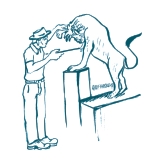| Learner's Club
Putting the meaning together!
Shaheen Kabir
When we are reading a good book, we don't always want to stop to look up the meaning of a word in the dictionary. Sometimes we can figure out what a word means from its context. The context of a word is the words or phrases surrounding the word that can help us figure out its meaning.
For instance, the word 'fan' can mean 'an admirer', or it can mean 'an instrument for cooling the air'. When we read a sentence like “I've long been a fan of Humayun Ahmed's books”, we, of course, know that 'fan' here means an admirer because its other meaning would not make sense.
Sometimes we may need to look for helpful hints or clues in more than one sentence in the paragraph.
The following paragraph is taken from a story about a little girl called Mary. As you read, you will find the word 'calico'. Can you figure out from the context what 'calico' means?
One day Mary said to her mother, “Next time you go into town, will you get me some cotton cloth? I want to make a new dress before school starts. It will have to be cheap cloth, because I want to pay for it myself. Try to pick out a bright coloured pattern.
Mary's mother nodded. On her shopping list she wrote: three yards of calico for Mary.
There is no one sentence that tells you what calico means. But if you read the paragraph carefully, you will find hints that tell you quite a bit about the word. For example,
Calico is a kind of .........
Calico is used to ...........
Calico is made of cotton .....
Calico may have a .......... and ............. pattern.
Calico costs ............... |
 |
Can you complete the above five sentences and then write a one-sentence definition of “calico”?
Remember that learning of vocabulary is not just learning a word by memorising it with its meaning and spelling, but learning the whole range of meanings that go with it. You can work magic with some special syllables. All you need is a word you know. For example, take the word 'fold'. Add the syllable un- before it and you've made a new word, 'unfold'. Read the following sentences:
|

|
Shafiq folded his handkerchief carefully and handed it to me.
When I unfolded the handkerchief, there was a coin in it. |
A syllable that is added before a base word to change the meaning of the word is called a 'prefix'. By adding the prefix un- we have added 'not' to the meaning of the base word. Other prefixes that mean 'not' or 'the opposite of' are: dis-, im-, and in-. Here are some examples:
appear disappear
possible impossible
correct incorrect
Some prefixes have more than one syllable, e.g. over, under, inter. English has borrowed many prefixes from both Latin and Greek to indicate numbers. For example:
Number Prefix Words
half semi- semicircle, semiprecious
one uni-, mono- uniform, monograph, monologue
two bi-, du- bisect, dual
three tri- triangle, triplets
four quad- quadruple, quadrangle
five pent- pentagon
eight oct- octopus, octette
ten dec- decimal, decade
many multi- multicoloured, multimedia
A syllable that is added to the end of a word to add new meaning to the base word is
called a suffix. Read the following sentences and notice how the suffix -er changes
the meaning of the base word.
Can you train tigers and lions? No, I can't, but the circus has a good animal trainer.
|

|
Sometimes when you look up a word in a dictionary, it gives you the same word back again in the definition. For example, if you looked up the word miserliness you would find this definition: “quality of being miserly”. Since you don't know what miserly means, you'd look that word up and find that it meant stingy. Miserliness, then, means “the quality of being the quality of being stingy”. Therefore, if you learn the meanings of some common suffixes like ness-, you can look up the root word only and attach the suffix to understand the meaning.
Study the chart below.
Suffix Meaning Examples Meaning
-ness : The quality, happiness, the condition of being happy
-ance : condition, annoyance, the state of being annoyed
-cence: fact of being magnificence the fact of being magnificent
-tion: adoration the state of adoring
There are many words in English which have multiple meanings. There are also many words that are spelt differently but are in fact pronounced the same, for example,
|

|
male - mail
stair - stare
rain - reign
bored - board
|
Words which have different spellings and different meanings but are pronounced the same way are called Homophones. There are a lot of jokes made with homophones. Here is one such joke for you, see if you can catch the play on words.
A city girl who has never been in a village before goes to visit a farm in a remote village for the first time. When she sees some cows grazing in the field, she's ecstatic and cries out,
“What a lovely bunch of cows!”
The farmer corrects her, “Herd of cows, Miss.”
“Of course I've heard of cows!” she replies.
“No, I mean a cow herd,” explains the farmer.
She ends the conversation by saying,
“So, what do I care? I have no secret
from the cow."
|

|
Copyright
(R) thedailystar.net 2007 |
